Puerto Rico board submits third plan in attempt to restructure power company debt of $10 billion
Lawyers have filed a new plan for restructuring $10 billion in debt owed by Puerto Rico’s power company in the latest attempt to end a lengthy bankruptcy process marked by acrimonious negotiations

Your support helps us to tell the story
From reproductive rights to climate change to Big Tech, The Independent is on the ground when the story is developing. Whether it's investigating the financials of Elon Musk's pro-Trump PAC or producing our latest documentary, 'The A Word', which shines a light on the American women fighting for reproductive rights, we know how important it is to parse out the facts from the messaging.
At such a critical moment in US history, we need reporters on the ground. Your donation allows us to keep sending journalists to speak to both sides of the story.
The Independent is trusted by Americans across the entire political spectrum. And unlike many other quality news outlets, we choose not to lock Americans out of our reporting and analysis with paywalls. We believe quality journalism should be available to everyone, paid for by those who can afford it.
Your support makes all the difference.A new plan for restructuring $10 billion in debt owed by Puerto Rico’s power company was filed late Friday in the latest attempt to end a lengthy bankruptcy process marked by acrimonious negotiations.
The plan filed by a federal control board that oversees the U.S. territory’s finances would cut the debt of Puerto Rico’s Electric Power Authority by nearly 80% to some $2.5 billion.
“We hope that we will be closing not just the chapter but most of the book on the largest public sector bankruptcy in the United States,” Robert Mujica, the board’s executive director, said in a meeting with reporters.
If confirmed by a federal bankruptcy judge, the plan would mean an increase in already high power bills for many people on the island if the new charge is approved by Puerto Rico’s Energy Bureau.
On average, residential bills would increase by nearly $9 a month and commercial bills by $35.
Some 1.4 million customers would not pay the new charge if they consume less than 425 kilowatt-hours a month, the plan states. The average monthly power consumption for a U.S. residential customer is about 886 kilowatt-hours, according to the U.S. Energy Information Administration.
Recent electric bill increases have been criticized by many on the island of 3.2 million people hit by power outages ever since the grid was razed by Hurricane Maria in 2017, with crews only recently starting to rebuild it.
The newest debt restructuring plan is backed by companies that hold more than 40% of uninsured bonds issued by Puerto Rico’s Electric Power Authority, according to the board. Those companies agreed to buy new bonds issued by the power authority, which would then use that money to pay some creditors in cash.
Friday’s filing comes more than eight years after Puerto Rico announced that it was unable to pay its more than $70 billion public debt, which was accumulated through decades of corruption, mismanagement and excessive borrowing.
In 2017, it filed for the biggest municipal bankruptcy in U.S. history. Since then, most of the debt owed by Puerto Rico’s government agencies has been restructured, except that of the power company, with efforts stalled amid tense and drawn-out negotiations.
The debt restructuring plan filed Friday is the third such plan and comes after a federal judge earlier reduced bondholders’ claims.
“Nobody wins … if (the power company) remains financially unstable,” board chairman David Skeel said during the meeting with reporters.
Last week, former board member Justin Peterson, who was appointed by then President Donald Trump, announced he was resigning because he did not support a restructuring deal that he said was “unfair, coercive and discriminatory.”
He accused the board of “essentially wiping out bondholders while keeping pensions fully intact. This is wrong.”
Skeel said the plan could be confirmed in January, but there are challenges from those who oppose the newest plan.